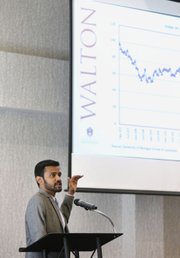FAYETTEVILLE -- The first quarter of the year has brought the same kind of population and job growth Northwest Arkansas has enjoyed for years, but the retail industry's struggles and national politics might bring some local headaches, a University of Arkansas economist said Tuesday.
The Fayetteville-Springdale-Rogers metropolitan area reached a peak of more than 250,000 people employed in non-farm work and saw growth in almost every job category from January to April, said Mervin Jebaraj, interim director of the university's Center for Business and Economic Research. He spoke to dozens of bankers, lawyers and other professionals over lunch.
Web watch
To see more of the University of Arkansas Center for Business and Economic Research’s analysis of the area’s economy, go to http://cber.uark.ed…">cber.uark.edu.
In many ways, it was the same story as the past several years for the area. Northwest Arkansas' unemployment rate, just above 2 percent, is the lowest of any Arkansas metro, Jebaraj said. More houses are selling for high prices. Almost every apartment is occupied, real estate company CBRE Northwest Arkansas reports. Museums, trails, breweries and other amenities draw still more people to live here. The Northwest Arkansas metro area includes Benton, Washington and Madison counties in Arkansas and McDonald County in Missouri.
"The question is can this go further," Jebaraj said of the low unemployment, which hasn't raised wages as might be expected when companies compete for employees. The falling rate could mean people are re-entering the workforce after giving up for a while or that companies aren't finding enough employees with the needed skills.
Cities, school districts, post-secondary schools, chambers of commerce and others in the area are working together to try to meet those needs, particularly in so-called middle-skill fields that don't need a bachelor's degree, but those efforts are still building.
"It is possible for this rate to push lower," Jebaraj said of unemployment.
But the quarter also brought a few bumps, according to Jebaraj's analysis.
The election of a Republican Congress and President Donald Trump sparked optimism among some businesses and consumers hoping for infrastructure investments or rollbacks on environmental and financial regulations prized by Democrats. Several Northwest Arkansas employers shared that optimism, according to the nonprofit Northwest Arkansas Council's regional survey last year and industry groups.
The Arkansas Community Bankers Association, for example, pressed Republicans earlier this year to tweak rules imposed on financial institutions after the recession of about a decade ago. The group wants the rules governing who can receive loans to be more flexible for its members than for the multinational titans requiring government bailouts during the recession.
But the Republican agenda on health care and other issues has been delayed by political opposition around the country, internal disagreements and an investigation into the Trump campaign's ties to Russia. So far the economy hasn't noticeably slowed because of unmet expectations or political chaos, Jebaraj said, but consumers and businesses could lose some optimism if the situation stretches on.
Other concerns are more local. Home-ownership rates in the area have fallen for years and more or less stuck to that trend the past few months, Jebaraj said. Sears and other major retailers, which anchor Fayetteville's Northwest Arkansas Mall and Rogers' Pinnacle Hills Promenade, have reported falling profit and closed stores nationally in the face of online shopping, though the local branches remain open.
"We're the most retailed country in the world, and Northwest Arkansas has even more retail than that," Jebaraj said. "We don't seem to have found the end of it yet," he added of the retail decline.
Steve Cox, senior vice president of economic development for the Rogers-Lowell Area Chamber of Commerce, said he hasn't heard about any impending closings locally. Instead he has seen retailers and other industries all try smaller locations friendlier to drive-through customers and e-commerce.
"It's not these massive big-box things -- it's much more still the same caliber, but then just have a sample" of a company's products on site, Cox said. With those adaptations and another wave of developments possibly approaching, "I think we'll continue to do fine," he said.
NW News on 05/24/2017

